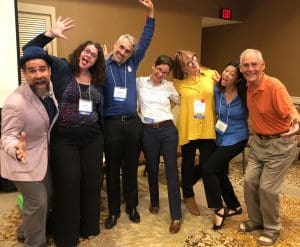Project Highlight, The D-PACE Initiative: A Discussion with Duncan Autrey
The Association for Conflict Resolution held its annual conference this fall in Tucson, Arizona. “Heal the Divide: A Focus on the Role of ADR Practitioners in a Divided Society” was attended by MBBI members and conflict transformation practitioners throughout the country to encourage a productive exchange of ideas centered on the peacebuilding role of alternative dispute resolution (ADR) in a polarized society. Duncan Autrey, along with MBBI leaders, Jessica Baen, Kenneth Cloke, Jarling Ho, Mary Leichliter, Scott Martin, and Wendy Wood, hosted a panel during the conference to discuss their most recent collaboration; the “Democracy, Politics, and Conflict Engagement Initiative” (D-PACE).
D-PACE is a volunteer-based platform for developing conflict literacy and capacity for interest-based communication in political movements and advocacy organizations. Through the dissemination of a ‘Conflict Literacy Toolkit,’ which is composed of various modules for managing conflict in these groups, their mission is to promote more creative and constructive approaches to conflict and to, effectively, strengthen democracy for a more just society.
“We all win or we all lose.”
 This is a guiding principle for Duncan who, for nearly a decade, has been involved with MBBI, demonstrating his commitment to the design of systems that encourage democratic communication among companies, communities, and governments. Based in Oakland, California, he brings 15 years of experience as a facilitator and conflict resolution specialist to his role with D-PACE. Duncan’s perspective on today’s political climate is that “The pervasive win-lose paradigm is highly destructive,” and conflict transformation practitioners are uniquely positioned to help heal this divide. He described, ” “We have identified a sincere need for conflict resolution capacity-building and literacy both within and among political groups and social movements.”
This is a guiding principle for Duncan who, for nearly a decade, has been involved with MBBI, demonstrating his commitment to the design of systems that encourage democratic communication among companies, communities, and governments. Based in Oakland, California, he brings 15 years of experience as a facilitator and conflict resolution specialist to his role with D-PACE. Duncan’s perspective on today’s political climate is that “The pervasive win-lose paradigm is highly destructive,” and conflict transformation practitioners are uniquely positioned to help heal this divide. He described, ” “We have identified a sincere need for conflict resolution capacity-building and literacy both within and among political groups and social movements.”
Further, “Our goal is not simply to increase civility but to explore our differences without losing touch with our common humanity,” Duncan noted. The D-PACE toolkit is meant to help channel the emotional underpinnings of political passion into effective discussions and concrete problem-solving.
The ‘Conflict Literacy Toolkit’
During the ADR conference, the D-PACE team presented detailed examples of their Toolkit, which comprises twenty distinct modules that can be navigated using a ‘Conflict Decision Tree.’ Circle Processes, Trauma-Informed Skill-Building, Sources of Political and Social Conflict, and Collaborative Negotiation were among the major topics addressed. Duncan explained that every aspect of the toolkit was founded on the belief that, “Conflict looks the same no matter what size it is.” Put another way, conflicts that arise between two people, ten people, entire communities, states, parties, or nations, may be addressed under a singular framework (or toolkit) involving basic mediation practices and interest-based solutions.
To demonstrate this process during their presentation, the D-PACE team split audience members into small groups and facilitated dialogues on numerous issues. Highlighting the diverse experiences and perspectives in the room, the result was shared learning and excitement about the application of ADR methodologies to help political movements and advocacy organizations work through disputes and achieve their missions. “We have created the ‘Conflict Literacy Toolkit’ to engage a broad array of organizational leaders and to bring these skills to the forefront of democracy and politics,” Duncan said.
The toolkit offers many avenues for managing political conflict “… in ways that are nuanced, interest-based and omnipartial.” Other modules in the toolkit place a focus on learning how to engage mindfully and manage chronic conflict as well as skills for consensus-building, managing polarity, and mediation for internal and external multi-party disputes.
The Current Need
The democratic political system was created in order to manage shared decisions, resolve conflicts, and uphold the best interests of the people within an inherently divided society. The D-PACE initiative was established on the same premise. Duncan explained, “Government is already a conflict resolution-based system. We are trying to upgrade that system by focusing on the quality of our interactions, understanding what motivates us, and creating spaces for dialogue across these divides.” This is the only way to address the serious challenges ahead.
Article by Juliana Heffern, MBBI Writer
